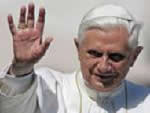|
Pope Benedict XVI- Angelus |
 Angelus Message
Angelus Message
On John Paul I
"Humility Can Be Considered His Spiritual Legacy"
H.H. Benedict XVI
September 28, 2008
www.zenit.org
Dear Brothers and Sisters!
Today the liturgy proposes to us the Gospel parable of the two sons
whom the father sent out to work in his vineyard. One of them
immediately says yes, but then does not go; the other at first
refuses, but then, repenting, follows his father’s wishes.
With this parable Jesus emphasizes his predilection for sinners who
convert, and he teaches us that humility is essential for welcoming
the gift of salvation. St. Paul, too, in the passage from the Letter
to the Philippians that we meditate on today, calls for humility.
“Do nothing out of selfishness or vainglory,” he writes, “but humbly
regard others as superior to you” (Philippians 2:3). These are
Christ’s own sentiments, he who laid aside divine glory for love of
us, became man and lowered himself even to dying on the cross (cf.
Philippians 2:5-8). The Greek verb that is used here, “ekenôsen,”
literally means that he “emptied himself” and places the profound
humility and infinite love of Jesus, the humble Servant par
excellence, in a clear light.
Reflecting on these biblical texts, I immediately thought of Pope
John Paul I, the 30th anniversary of whose death is today. He chose
Charles Borromeo’s motto as his own episcopal motto: “Humilitas”: a
single word that synthesizes what is essential in Christian life and
indicates the indispensable virtue of those who are called to the
service of authority in the Church.
In one of the four general audiences of his very brief pontificate
he said, among other things, in that tone that distinguished him: “I
will just recommend one virtue so dear to the Lord. He said, ‘Learn
from me who am meek and humble of heart.’ … Even if you have done
great things, say: ‘We are useless servants.’ Alternatively, the
tendency in all of us is rather the contrary: to show off” (General
Audience of Sept. 6, 1978). Humility can be considered his spiritual
legacy.
Because of this virtue of his, 33 days were enough for Pope Luciani
to enter into the hearts of the people. In his speeches he used
examples taken from concrete life, from his memories of family life
and from popular wisdom. His simplicity was a vehicle of a solid and
rich teaching that, thanks to the gift of an exceptional memory and
great culture, he adorned with numerous references to ecclesiastical
and secular writers.
He was thus an incomparable catechist, in the line of Pius X, his
fellow countryman and predecessor in the See of St. Mark and then in
the see of St. Peter. “We must feel small before God,” he said in
the same audience. And added: “I am not ashamed to feel like a child
before his mother; one believes in one's mother; I believe in the
Lord, in what he has revealed to me.”
These words display the whole breadth of his faith. As we thank God
for having given him to the Church and to the world, let us treasure
his example, exerting ourselves to cultivate his humility, which
made him capable of talking to everyone, especially the little and
so-called distant. For these intentions let us call upon Mary Most
Holy, humble handmaiden of the Lord.
[After the Angelus, the Holy Father greeted the pilgrims in several
languages. In Italian, he said:]
Summer has come to an end and I will return to the Vatican the day
after tomorrow. I thank the Lord for all the gifts he has bestowed
upon me during this time. I think especially of World Youth Day in
Sydney, the period of rest in Bressanone, the visit to Sardinia and
the apostolic trip to Paris and Lourdes; and I think of the
possibility of sojourning here in this house, where I am better able
to rest and work during the hottest months.
An affectionate greeting to the community of Castel Gandolfo, with a
heartfelt thank you to the bishop, the mayor and the various police
departments. Thanks to everyone and goodbye!
[In English, he said:]
I offer a warm welcome to the English-speaking visitors gathered for
this Angelus prayer. My special greeting goes to the students from
Aquinas College in Australia and to the members of the Fatima
pilgrimage from the Philippines. In today’s Gospel, the Lord asks us
to reflect whether we are obedient to the Father in word alone, or
truly committed to following his will in our daily lives. May his
words inspire in us a spirit of genuine conversion and an ever more
generous commitment to the spread of the Gospel. Upon you and your
families I cordially invoke God’s blessings of wisdom, joy and
peace!
[Speaking again in Italian, he said:]
As I offer best wishes to the students who have just begun the
academic year, I express appreciation for the “Making Me Study is
Good for Everyone” campaign of the St. Vincent de Paul Society. In
the spirit of St. Vincent, whom we celebrated in yesterday’s
liturgy, this initiative is proposed to prevent the poverty of
illiteracy.
I wish everyone a good month of October, month of the Holy Rosary,
during which, if it pleases God, I will go on pilgrimage to the
shrine of Our Lady at Pompei on Sunday, Oct. 19. Have a good Sunday!
© Copyright 2008 - Libreria Editrice Vaticana
Look
at the One they Pierced!
This page is the work of the Servants of the Pierced Hearts of Jesus and
Mary